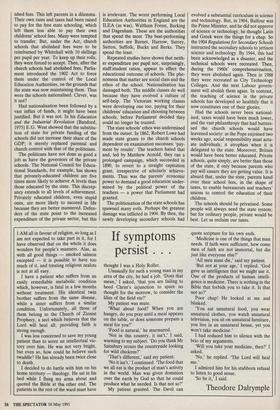If symptoms
persist . .
I AM all in favour of religion, so long as I am not expected to take part in it, for I have observed that on the whole it does wonders for people's manners. Alas, as with all good things — smoked salmon excepted — it is possible to have too much of it, and treating religious zealots is not at all easy.
I have a patient who suffers from an easily remediable metabolic condition which, however, is fatal in a few months without treatment. His identical twin brother suffers from the same disease, while a sister suffers from a similar condition. Unfortunately, all three of them belong to the Church of Zionist Prophecy, a sect which believes that the Lord will heal all, providing faith is strong enough.
I was less concerned to save my young patient than to score an intellectual vic- tory over him. He was not very bright, but even so, how could he believe such twaddle? He has already been twice close to death.
I decided to do battle with him on his home territory — theology. He sat in his bed while I flung my arms about and quoted the Bible at the other end. The patients in the rest of the ward must have thought I was a Holy Roller.
Unusually for such a young man in my area of the city, he had a job. 'Does that mean,' I asked, 'that you are failing to heed Christ's injunction to spare no thought for the morrow, to consider the lilies of the field etc?'
My patient was mute.
`What about food? When you are hungry, do you pray until a meal appears on the table, or does someone prepare a meal for you?'
`Food is natural,' he murmured.
`Not in this country, it isn't,' I said, warming to my subject. 'Do you think Mr Sainsbury scours the countryside looking for wild chickens?'
`That's different,' said my patient.
`No it isn't,' I continued. 'The food that we all eat is the product of man's activity in the world. Man was given dominion over the earth by God so that he could produce what he needed. Is that not so?'
My patient grunted. The Devil can quote scripture for his own ends.
`Medicine is one of the things that man needs. If faith were sufficient, how come men of faith are not immortal, but die just like everyone else?'
`All men must die,' said my patient.
`But not at your age,' I replied. 'God gave us intelligence that we might use it. One of the products of human intelli- gence is medicine. There is nothing in the Bible that forbids you to take it. Is that not so?'
Poor chap! He looked at me and blinked.
`You eat unnatural food, you wear unnatural clothes, you watch unnatural television, you sit on unnatural furniture, you live in an unnatural house, yet you won't take medicine.'
I had reduced him to silence with the brio of my arguments.
`Will you take your medicine, then?' I asked.
`No,' he replied. 'The Lord will heal me.'
I admired him for his stubborn refusal to listen to good sense.
`So be it,' I said.
Theodore Dalrymple


























































 Previous page
Previous page